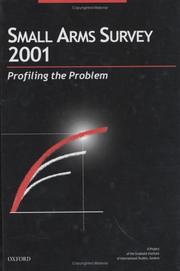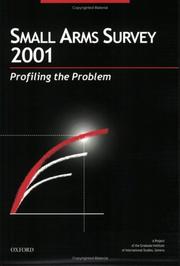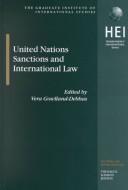| Listing 1 - 3 of 3 |
Sort by
|

ISBN: 9780521880411 9780521706568 019924670X Year: 2001 Publisher: Cambridge Cambridge University press
Abstract | Keywords | Export | Availability | Bookmark
 Loading...
Loading...Choose an application
- Reference Manager
- EndNote
- RefWorks (Direct export to RefWorks)
"The Small Arms Survey 2009 contains two thematic sections. The first highlights the challenges of ensuring security after the formal end of war and comprises an overview chapter and three case studies (Aceh, Afghanistan, and Southern Lebanon). The second thematic section explores various aspects of small arms transfers, including the value of the authorized trade, national controls, and weapons tracing. Additional chapters focus on small arms measures and impacts." "The Small Arms Survey is an independent research project located at the Graduate Institute of International and Development Studies in Geneva, Switzerland. It serves as the principal source of public information on all aspects of small arms and armed violence and as a resource centre for governments, policy-makers, researchers, and activists."--Jacket.
Economic relations. Trade --- Polemology --- wapenhandel --- 871.1 Kleine en lichte wapens --- 870 Defensie en wapens --- 871.1 Kleine en lichte wapens

ISBN: 0199246718 Year: 2001 Publisher: Oxford Oxford University Press
Abstract | Keywords | Export | Availability | Bookmark
 Loading...
Loading...Choose an application
- Reference Manager
- EndNote
- RefWorks (Direct export to RefWorks)

ISBN: 9789004502871 9789041116031 9041116036 Year: 2001 Publisher: The Hague: Kluwer law international,
Abstract | Keywords | Export | Availability | Bookmark
 Loading...
Loading...Choose an application
- Reference Manager
- EndNote
- RefWorks (Direct export to RefWorks)
The reactivation of the Security Council at the beginning of the last decade has resulted, since the invasion of Kuwait by Iraq on August 2, l990, in increasing use of its powers under Chapter VII of the Charter and the adoption of measures against a number of state and non-state entities. The notion of a threat to the peace has now come to encompass violations of fundamental norms of international law such as human rights and humanitarian law, and the wide-ranging measures adopted have included such innovations as the establishment of the UN Compensation Commission or that of the two international criminal tribunals for Former Yugoslavia and Rwanda. These measures have not only infringed on the legal rights of the targeted state (sometimes with irreversible effects where they have remained in force over a long period of time) and its population, but also on those of implementing states and of private rights within these states. The current debate over the legitimacy and long-term effects of economic sanctions on states and their populations makes it imperative to re-evaluate this instrument and the broader peace maintenance function of the Security Council in the light of current community concerns. Part One of this book addresses the theoretical issues by focussing on: 1) The place of sanctions in the international legal system; 2) the limits to the powers of the Security Council and the question of accountability; and 3) an assessment of the alternatives to collective economic sanctions. Part Two looks at the relationship between sanctions and humanitarian issues, examining the relationship between: 1) Sanctions and human rights law; 2) sanctions, humanitarian issues and mandates; and 3) sanctions and humanitarian law. Part Three focuses on implementation by states of Security Council sanctions resolutions by examining: 1) Sanctions and private rights; and 2) special problems for implementing states. Part Four addresses the future in reassessing the place and ethics of sanctions in an international legal system which is giving increased importance to the individual. This work is based on papers presented at a colloquium of the Graduate Institute of International Studies in Geneva.
| Listing 1 - 3 of 3 |
Sort by
|

 Search
Search Feedback
Feedback About UniCat
About UniCat  Help
Help News
News